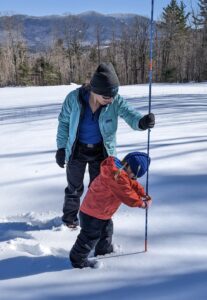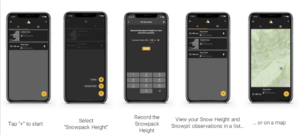Be Part of the COMMUNITY SNOW OBSERVATIONS PROJECT – by Sarah Sallade
January 16, 2025
Posted in
by Sarah Sallade
Sarah Sallade is an Ambassador for the Community Snow Observations (CSO) Project, an educator and an AMC NH Chapter volunteer ski leader
 Do you love snow? Do you hike, snowmobile, or ski during the winter months? Do you get out in the woods in the backyard or the backcountry during winter? If you answered “yes” to any of these questions you might be interested in the Community Snow Observations (CSO) project (https://communitysnowobs.org/).
Do you love snow? Do you hike, snowmobile, or ski during the winter months? Do you get out in the woods in the backyard or the backcountry during winter? If you answered “yes” to any of these questions you might be interested in the Community Snow Observations (CSO) project (https://communitysnowobs.org/).
My name is Sarah Sallade and I’m an ambassador for CSO, an ecologist, an educator, and an AMC NH Chapter volunteer ski leader. I am here to share with you that this project couldn’t be easier and it is a great way to have a meaningful impact on the outdoor community while you’re out having fun.
 Community Snow Observations is a project that is run out of the University of Oregon, with a science team that collaborates with a lot of other scientists and ambassadors across the country and around the world. The primary goal of the project is to increase snowpack depth data collection across the landscape so that we have enough data to feed into computer models that can then predict microscale changes in snowpack throughout the season and over the years. This kind of data is needed to understand a variety of topics scientists are interested in, including when and where water is available in the spring and summer months, how climate change is impacting snow cover, how snow depth and extent changes are impacting flora and fauna at different elevations from mountain tops down to the valleys.
Community Snow Observations is a project that is run out of the University of Oregon, with a science team that collaborates with a lot of other scientists and ambassadors across the country and around the world. The primary goal of the project is to increase snowpack depth data collection across the landscape so that we have enough data to feed into computer models that can then predict microscale changes in snowpack throughout the season and over the years. This kind of data is needed to understand a variety of topics scientists are interested in, including when and where water is available in the spring and summer months, how climate change is impacting snow cover, how snow depth and extent changes are impacting flora and fauna at different elevations from mountain tops down to the valleys.
While we have many weather stations that can measure precipitation data including snow, these stations are at fixed points in the landscape. The CSO project instead asks snow “users” including snowmobilers, backcountry skiers, snowshoers, and winter hikers to measure snow depth while they are out recreating. When the project started, data collection focused on what was beyond the everyday activities of most people, but as the project has continued, science researchers in New England from AMC, the University of New Hampshire, and beyond have found that more data is better, even if it is on local walking trails and open land (forests, meadows, etc.) behind your own home, as long as it is collected correctly. This means that any person or group can measure snowpack depth data in their community. This means you can measure on a solo tour, when out with your family, or even if you are leading a trip!
The other great aspect of this project is that the data is available for anyone to download (https://communitysnowobs.org/snow-data/) and view in map form (https://www.mountainsnow.org/home) to be used in classrooms for analysis or by snow users to help plan their next trip.
To participate you need very few things:
- A sturdy measuring device that can break through snow layers to reach the ground, such as a metal meter stick or avalanche probe. You can even make your own out of a ski pole!
- A smartphone or tablet with the SnowScope App installed.
- 5 minutes of time.

The process is simple:
- Go outside and find an area of undisturbed snow.
- Make 3 snowpack depth measurements in centimeters within a 1-2 meter area.
- Find the mean value of the measurements.
- Enter the value into the SnowScope App at your current location.
How often you measure is your choice:
- Once
- Everyday you frequent the same location
- Measure at multiple locations on a trail that you are moving along
If you are interested in learning more about the scientific studies that your collected data contributes to, you can meet some of the researchers, read their peer reviewed science articles, or check out the AMC blog and UNH Institute for Earth Oceans and Space (EOS) newsletter.
- AMC Research Team: https://www.outdoors.org/research-team/
- AMC Blog: https://www.outdoors.org/resources/amc-outdoors/
- UNH EOS Newsletter: https://eos.unh.edu/about/convergence-eos-news-updates
If you are interested in connecting snow collection data to other related projects or are looking for a curriculum that supports the study of precipitation or snow more specifically you should check out these resources:
Connected Curriculum/Activities:
- Hubbard Brook Ecosystem Study
- Winter Wildlands Alliance SnowSchool
- The GLOBE Program Learning Activities
Citizen/Participatory Science:
- Community Collaborative Rain, Hail and Snow Network
- Nature’s Notebook
- Project FeederWatch
- UNH Participatory Sciences: https://experience.arcgis.com/experience/f0048479f2304cbcb59c9ede05d58af1/page/Home/